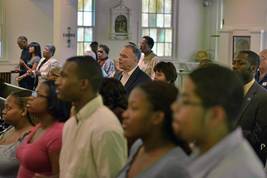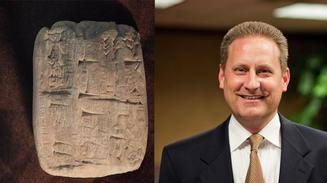weekly column
|
Each week, find a commentary on something connected to verses of Torah or another source of wisdom
|
|
Each week, find a commentary on something connected to verses of Torah or another source of wisdom
|
 The Genesis:3 Project But presently, seven other cows came up from the Nile close behind them, ugly and gaunt, and stood beside the cows on the bank of the Nile Genesis 41:3 Some years ago, I engaged with a frustrating negotiation with a prominent house of worship in my community. As part of their openness to cross-cultural and interfaith dialogue, they invited a controversial foreign leader with a very bad record of anti-Jewish and anti-Israel rhetoric. The individual, also a clergy member, was on a rehabilitation tour after being deposed from office for being, of all things, too liberal. I had a close relationship with people in the house of worship and was part of a delegation that protested, persuaded and received an apology. Of course, not only was the controversial figure highlighted in subsequent publicity, but he was invited a second time. Scrambling to make nice to us, the leadership of the institution offered to host a prominent and well-respected rabbi to speak in the same circumstances as the person we found so objectionable. It was the best we could expect after the fact, and so we reluctantly agreed that it was a step in the right direction. The rabbi turned them down. He would not speak in house of worship that was not Jewish. And we were not willing to have him speak in a tent on the lawn, out of respect both for the rabbi and for the house of worship. There is a prohibition in Jewish law of visiting non-Jewish houses of worship, most especially Christian ones. It is far from unanimous, but the church prohibition has some heavy hitters behind it. The result is that important voices in traditional Jewish thought are absent in intellectually and theologically open communities. (And please do not suggest a change in venue; imagine someone saying, “I will talk to Jews, but I won’t, on principle, enter a synagogue.”) So what, you might ask. Certainly there are plenty of ways for people to hear about diverse approaches to God and life! Here’s the so what. The arrogance that suggests that there is something inferior about the way non-Jewish religious communities reach to God is a desecration of God. We have never contended that our covenant is exclusive, even if it is (like others) unique. When we declare the worship by others and the place it takes place as idolatrous, which is the source of the prohibition, we close off the possibility that God’s presence is genuinely revealed by non-Jews who open their hearts and souls. I had such an experience recently with the remarkable Senator Tim Kaine of Virginia. Sen. Kaine is a deeply religious man in every sense of the word…except Jewish. His strong Catholic upbringing informs every aspect of his life, including his government service. In a recent speech he acknowledged that his title often brings him into contact with people a senator is not well-equipped to deal with. He relies instead on his faith. He told of sitting with a bereaved mother who lost her son to violence. Unwilling to share platitudes about “thoughts and prayers,” he said to this Christian woman devastated by her loss, “I can’t know your pain, but you have a God who knows what it is like to lose a child.” The small audience gasped with admiration, myself included. Sen. Kaine’s interpretive approach, one I would never have imagined myself or used even in similar circumstances, made divine comfort available to an unimaginably devastated mother. My response to his story, had I not appreciated the wholeness of the context, would have been either confusion or disdain. If Christian iconography is idolatry, then the story of death and resurrection is so much nonsense. And while Christians and others are just as capable as Jews of falling off the path, the wisdom and insight of what such a relationship with God means would be lost to us if we believed that only our way of believing and practicing is correct and acceptable to the Holy One. We would arrogate to ourselves the power to limit God. Joseph stood before Pharaoh, god of Egypt, whose own self-worship and ministering priests could not bring him insight and comfort. Imagine Pharaoh describing his dreams, asking Joseph for an interpretation, and hearing, “I am sorry, Pharaoh, but I shouldn’t even be here in this idolatrous temple, let alone bringing God with me.” You can’t imagine it. Joseph would be dead, the Israelites would have starved in Canaan and the Bible would have ended in chapter 41 of Genesis. You wouldn’t be here reading this. There is wisdom, insight and inspiration everywhere that people seek it. If we wish to have a fuller understanding of God, then we must never close off the opportunity to hear God’s voice.
0 Comments
 The Genesis:3 Project and put them in custody, in the house of the chief steward, in the same prison house where Joseph was confined. Genesis 40:3 I sometimes compare the rallying cries of the American Revolution and the Talmud. Famously, Patrick Henry proclaimed, “Give me liberty or give me death!” (The British were prepared to accept the proposition.) But in the Talmud (specifically, Ta’anit 23a), the sage Rava declares “Give me companionship or give me death.” Rava’s aphorism deserves some background. Long before Rip Van Winkle, Choni the Circle-Maker fell asleep for seventy years and awoke to an unfamiliar world. Though celebrated for his closeness with God and ability to provoke God’s compassion, Choni wanted no part of a world without familiar faces and intimate friends. When he died of loneliness, Rava observed that the story was the origin of the Aramaic saying o chevruta, o mituta, “either companionship or death.” It is not fair to Mr. Henry to put him up against Choni. He was inspiring oppressed people to revolt; he called to his comrades in arms to prepare for the ultimate sacrifice in defense of their freedom. A nation was being born! No one today would respond to that call in any sense other than a symbolic one. But Choni was facing a life of loneliness all too familiar to lots of people in today’s world. For some folks, that sense of being alone in the world is the result of heartbreak. For others, it is the result of mental deterioration. And for others still, like Choni, it is the result of living longer than any of their friends. There are simple ways to address those causes of loneliness – they needn’t be deadly. Showing a little love may not be a cure, but it can be a lifeline. But for some people in our society, social isolation is indeed a fate worse than death. Let me warn you that these are people for whom you will have little sympathy. I make that statement because I myself struggle with the notion of compassion for individuals who have committed crimes resulting in incarceration. I spent some years as a prison chaplain and learned from the inmates that there is only one innocent person in any prison – the one you are talking to. Very few inmates would embrace Patrick Henry’s words in their own circumstances – even those serving life sentences. But there is a subset of inmates who understand Choni’s lament. They are the inmates who are serving time in solitary confinement. The debilitating effects of complete social isolation are unquestionable, and they get worse as the term of that isolation increases, and worse still when the individual suffers from any kind of mental illness. I know. Like me, you want to say they deserve it. In some cases, their crimes are heinous. In other cases, they would not survive the antagonism they would face in the general population. In still other cases, they have compounded their punishment by bad behavior in prison. Yes, yes and yes. But the imposition of solitary confinement is far more widespread and for much longer periods of time for most inmates than is necessary or healthy. When that happens, it is cruel and unusual punishment. Of all the causes you might champion, this one probably strikes you as being among the lowest of priorities. But please think again about what it means to dehumanize another person by inflicting such isolation. Like all of our rights and moral standards, the measure of their integrity is not when they are self-evident, but when they hardest to preserve. The baker and the cup-bearer who were thrown into jail with Joseph faced their ultimate fates independent of the companionship the three men had in jail. The baker’s death was inevitable; the cupbearer was restored. And Joseph was destined for greatness, but could not have been redeemed except for his interactions with others. O chevruta, o mituta. Either companionship or death.  The Genesis:3 Project And when his master saw that the LORD was with him and that the LORD lent success to everything he undertook, Genesis 39:3 I have always been conscious of the scrutiny that accompanies an implied connection to God. It is unavoidable when you carry around the title of “rabbi,” or any other kind of pastoral designation. My aspiration (which I am guessing is not much different than most clergy), is to live up to and into the ordination I have earned. I don’t believe that it conveys any special measure of holiness in and of itself. Yes, I know that certain kinds of priests and scholars have authority that comes with their title, but the quality of character is earned, not bestowed. There is no quicker way to insult and embarrass me than to play the rabbi card. When I hear someone (generally not a rabbi) go into the wind-up before the pitch with words like, “I would think that as a rabbi you would…” it takes every ounce of self-control I have not to (rhetorically) pounce on the speaker. I know my response comes from my knowledge that my every action is a reflection on all rabbis. I know it because so much of my career has been spent mending the frustrations remembered by Jews about other rabbis. Those colleagues were mostly doing their best and had the misfortune to say or do something that struck a raw nerve. I pay the price for them and others will, in turn, pay the price for my fallibility. Sometimes, however, we “holy people” set ourselves up. The cynics in society love the tales of the televangelists who succumb to the opportunities of wealth, of the strictly observant rabbis who have defrauded the government or been exposed for sexual deviance, of the imams and gurus whose asceticism turns out to have a weak point for drugs or sex. By allowing and encouraging a perception that “the Lord is with him and that the Lord lent success to everything he undertook,” the self-described lowly servant can wind up elevated to a high position in which bad behavior is invited and temptation is almost impossible to resist. Just ask Joseph who – by most accounts – was set up. But cynicism about this guy who was too good to be true led his boss to almost revel in his fall from the pedestal. I was thinking of these matters as I read of the Department of Justice’s settlement with Hobby Lobby over illegally obtained artifacts from Iraq. If you missed the story, stolen objects from the Fertile Crescent’s rich pre-Biblical an Bible-era history disappeared from Iraq and turned up in suspicious circumstances in Oklahoma, shipped to various addresses of the arts and crafts chain’s headquarters. The reporting on the story has been very careful, but it has not overlooked two details which will be connected by anyone paying attention to the news. The first is that Hobby Lobby is owned by the Green family whose claim of deeply held religious convictions led them to seek to deny certain kinds of birth control benefits to their employees under the Affordable Health Care Act. (Specifically, they are the kinds that prevent a pregnancy from continuing once conception takes place.) After a long journey through the courts, the Supreme Court ruled that a closely-held business like Hobby Lobby, though worth millions of dollars and structured to protect its owners from legal action against them personally, was an extension of the owners’ religious beliefs. The Greens, most especially Steve Green, the head of the family, have used a substantial amount of the money acquired through Hobby Lobby to build a new museum in Washington, DC – the Museum of the Bible. It is scheduled to open this fall and is designed to promote Mr. Green’s deeply held religious conviction that the Bible is the most important book in the world, and that if people were more familiar with it our society would be a better place. Mr. Green has ample evidence to claim that “the Lord is with him and that the Lord lent success to everything he undertook.” This scandal is far from the indulgences of the flesh that have typified so many other times that the mighty have been toppled. But specifically because it is devoid of prurient aspects it is, in many ways, much more serious. A businessman who very publicly insists on conducting his business affairs in consonance with a comprehensive devotion to the principles of his faith, and who then uses the gain from those business affairs to promote the guide to his presumed righteousness will be hard-pressed to explain the deceptions and illegalities to which he has admitted. Joseph, of course, was redeemed. Though his presumed offense was never pardoned and his accuser never recanted, he proved his worth again when a stroke of luck put him in Pharaoh’s court. Once again the Lord lent success to everything he undertook. But first, he rediscovered humility and gave up on the notion that his dreams of grandeur as a young man were somehow his by privilege. The best rabbis learn that lesson, too. The best clergy of all traditions model that humility for the aspiring righteous in their flocks. Let’s keep an eye on Hobby Lobby and the Green family to see what lesson might be learned by them and from them.  The Genesis:3 Project She conceived and bore a son, and he named him Er. Genesis 38:3 There is no such thing as an inconsequential life, but that doesn’t mean that some people don’t squander their consequence. We all know stories of people who were bound for greatness and elected to take a detour. The baseball star who showed such potential, but invested in drugs instead of himself. The business genius whose greed exceeded his legal opportunities. The actress whose confidence in her talent was insufficient to deal with the changes in her appearance, so she had her face and body surgically altered. The manufacturer whose efficiencies turn out to be dangerous compromises of quality. And these days we are particularly focused on politicians whose chances to do good are squandered in their constant quest to retain office. Such a person is Clay Higgins. Look him up online. At this writing, he is a first-term Member of the House of Representatives from the Louisiana gulf coast. Mr. Higgins was a man with an unremarkable career when he landed a position as a sheriff’s department spokesperson. His weekly “Crimestopper” videos were increasingly popular, especially when he began addressing suspects by name. But the success seemed to go to his head, and he was warned a number of times to temper his language and his threats. Eventually, he resigned from the sheriff’s department. But the local party found him to be a no-nonsense personality and put him up for Congress. Billing himself as the “Cajun John Wayne,” he was elected. And once in office for just five months, he responded to a terrorist attack in the UK by calling for extra-judicial killings (that is, murder) of all “radicalized Islamic suspects” in the name of “Christendom.” The end of his statement was the unambiguous: “Hunt them, identify them, and kill them. Kill them all. For the sake of all that is good and righteous. Kill them all.” As you might imagine, his press office tried to explain away his words, but there was insufficient ambiguity for it to be successful. His good luck is that there is so much outrageous behavior from politicians higher on the food chain that his statement faded into the background. (I made a public call for his resignation, for the record.) But a month later, Rep. Higgins made a video as he toured Auschwitz. Standing in the gas chamber where hundreds of thousands of innocents were murdered, using ovens in the main camp (the larger crematoria in Birkenau were destroyed) as a backdrop, the Congressman solemnly intoned the importance of homeland security and a dominant military to prevent such horrors from being visited on the United States. The logical fallacies in his arguments are self-evident, but the abysmal judgment that brought him to Auschwitz to create a video (with a “Schindler’s List” soundtrack, no less) has further demeaned office he holds. (It ends, by the way, with the gentleman in a prayer pose overlaid with the flags of the United States and Israel.) The Auschwitz-Birkenau Memorial and Museum called him out, and he took down the video. His apology notes his support of Israel and a strong military – certainly sincere and accurate representations, but yet another attempt to politicize his wrongheaded passions. I have the privilege of knowing many elected officials on both sides of the aisle. Almost to the person, they recognize the privilege granted to them to serve their constituencies and the Constitution. Some of them hold policy positions I find noxious, and some others are cockeyed optimists. Most of them hope to elevate the unalienable rights and common values that make this country great. We do not know what Er did to squander his consequence, but that is all he is remembered for. The Bible spares him the indignity of specifics. History won’t be that considerate of Clay Higgins. |
Archives
October 2023
Categories |